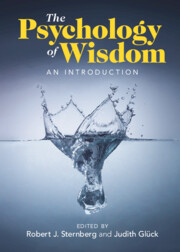Book contents
- The Psychology of Wisdom
- The Psychology of Wisdom
- Copyright page
- Contents
- Figures
- Tables
- Contributors
- Preface
- Part I Introduction to Wisdom Theory and Research
- Part II Foundations of Wisdom in the Individual and in the World
- Chapter 7 Wisdom, Creativity, and Intelligence
- Chapter 8 Wisdom, Morality, and Ethics
- Chapter 9 Wisdom, Personality, and Well-Being
- Chapter 10 The Wisdom in Emotions
- Part III The Modifiability of Wisdom
- Part IV Wisdom in the World
- Index
- References
Chapter 7 - Wisdom, Creativity, and Intelligence
from Part II - Foundations of Wisdom in the Individual and in the World
Published online by Cambridge University Press: 26 May 2022
- The Psychology of Wisdom
- The Psychology of Wisdom
- Copyright page
- Contents
- Figures
- Tables
- Contributors
- Preface
- Part I Introduction to Wisdom Theory and Research
- Part II Foundations of Wisdom in the Individual and in the World
- Chapter 7 Wisdom, Creativity, and Intelligence
- Chapter 8 Wisdom, Morality, and Ethics
- Chapter 9 Wisdom, Personality, and Well-Being
- Chapter 10 The Wisdom in Emotions
- Part III The Modifiability of Wisdom
- Part IV Wisdom in the World
- Index
- References
Summary
In this chapter, we examine how creativity, intelligence, and wisdom are related in theoretical frameworks and empirical studies. First, definitions of the three constructs are discussed. Although all of them are complex and multifaceted, the relationship between creativity and intelligence has been extensively studied based on their working definitions and models. However, wisdom research remains sparse, and there is a gap between people’s common beliefs and explicit theories of how wisdom is related to intelligence and creativity. Regardless, some common elements of wisdom have been distilled. These include self-awareness, knowledge, and strategies to cope with uncertainty, which can lead to contributions to social goodness. Second, several empirical studies are reviewed. They show some relationships among the three constructs, but the results have been inconsistent. Third, the WICS model, as a cognitive framework, is used to understand the relationships among the three constructs. The model integrated intelligence, creativity, and wisdom, and has also been tested in some fields. Finally, we argue that wisdom, as a distinguishable component of ability, can help determine whether our intelligence and creativity will be harnessed toward benevolence or malevolence.
- Type
- Chapter
- Information
- The Psychology of WisdomAn Introduction, pp. 107 - 117Publisher: Cambridge University PressPrint publication year: 2022

